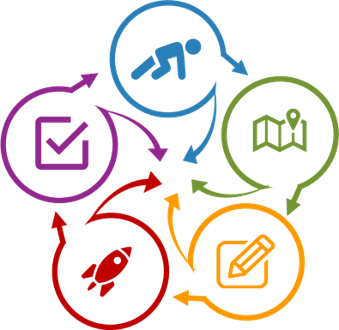Based on: Bower, M., & Torrington, J. (2020). Typology of free web-based learning technologies (2020). EDUCAUSE digital library. https://library.educause.edu/resources/2020/4/typology-of-free-web-based-learning-technologies
(Return to Introduction to Typology of Free Web-based Technologies)
(Search by Instructional Function – opens GoogleSheet in new tab)
Individual website creation
Individual website creation tools enable single users to create websites from customisable templates through a point-and-click interface (no coding required).
Note that many of these have basic free plans with fees for premium services.
| Google Sites (https://sites.google.com/new) | create websites from customisable templates |
| Tripod (http://tripod.lycos.com) | create websites from customisable templates |
| Wix (http://wix.com) | create websites from customisable templates |
| Jimdo (http://jimdo.com) | create websites from customisable templates |
| Moonfruit (http://moonfruit.com) | create websites from customisable templates |
| Weebly (http://weebly.com) | also integrates a blog tool |
| Glogster (http://glogster.com) | GONE provides a simple to use interface for creating visually appealing posters that can be made available as a URL for single page websites |
Wikis
Wikis enable multiple users to create, edit and link multi-page websites through their webbrowser, making them ideal for project workspaces or collaborative knowledge bases and for project workspaces.
Recently there has been a decline in the number of freely available served wikis, though there are still platforms that are offered with a limited users, or postings, or advertising
| PBworks (http://pbworks.com) | frequently used wiki that is free for education |
| Confluence (https://www.atlassian.com/software/confluence) | freely available, but offered with a limited users, or postings, or advertising |
| Nuclino (https://www.nuclino.com) | freely available, but offered with a limited users, or postings, or advertising |
| Zoho Wiki (https://www.zoho.com/wiki) | freely available, but offered with a limited users, or postings, or advertising |
| Wikidot (https://www.wikidot.com) | freely available, but offered with a limited users, or postings, or advertising |
Blogs
Blogs differ from wikis in that they organise website posts in chronological order. This makes making the suitable for teachers and students to represent and track evolving thinking over time.
| WordPress (https://wordpress.com) | includes multimedia libraries, numerous templates and a host of wigets to enhance the functionality of their blogs |
| Edublogs (http://edublogs.org) | based upon the WordPress platform and offers teachers the capacity to create and administer an entire class of blogs through a secure portal |
| Tumblr (http://tumblr.com) | easy to use interface and simple resharing facilities |
| Blogger (http://blogger.com) | well renown blogging site now owned by Google |
| Paper.li (http://paper.li) | GONE well renown blogging site now owned by Google |
| RebelMouse (https://rebelmouse.com) | provides online newsletter publishing tools with a commercial agenda but do allow free use for individuals |
| Penzu (http://penzu.com) | allows students to create private notebook entries and embed images, with a range of classroom management, tracking and assessment tools for teachers |
